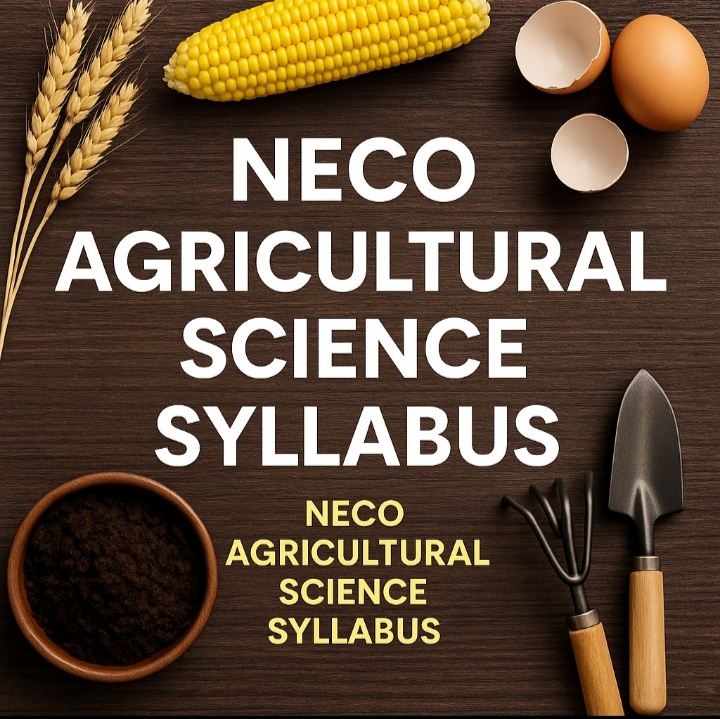Are you writing Agricultural Science in your NECO (SSCE or GCE) exam this year? The NECO Agricultural Science syllabus helps you know where all your NECO Agric questions will be asked from.
You will see the NECO Agricultural Science exam structure, full list of syllabus topics, areas of concentration and study tips on Agricultural Science in NECO exam this year.

Let’s begin..
NECO Agricultural Science Exam Structure
The exam is divided into three papers:
SECTION 1
Paper 1: Objective Questions
- 50 multiple-choice questions
- 50 minutes
- Total of 50 marks
Paper 2: Essay/Theory
- 6 essay questions (answer 5)
- Covers a wide range of syllabus topics
- 2 hours 10 minutes
- 90 marks
SECTION 2
Paper 3: Practical (or Alternative to Practical)
- 4 questions (answer all)
- 1 hour 30 minutes
- 60 marks
- School candidates do the practical; private candidates take an alternative practical test
See NECO Agricultural Science Syllabus
Here are the Agricultural Science topics and areas of concentration under each topic which you must study according to the official NECO syllabus.
1. Basic Concepts
- Meaning and importance of agriculture
- Problems of agricultural development and possible solutions
- Meaning and differences between subsistence and commercial agriculture
- Roles of government in agricultural development
- Role of non-governmental organizations in agricultural development
- Agricultural laws and reforms
2. Agricultural Ecology
- Meaning and importance of agricultural ecology
- Land and its uses
- Factors affecting land availability for agricultural purpose
- Agro-allied industries and relationship between agriculture and industry
- Environmental factors affecting crop and animal distribution and production
- Rock formation
- Soil formation and profile development
- Types, composition and properties of soil
- Plant nutrients and nutrient cycle
- Irrigation
- Drainage
- Agricultural pollution
3. Agricultural Engineering/Mechanization
- Simple farm tools
- Farm machinery and implements
- Maintenance practices and precautionary measures
- Agricultural mechanization
- Prospects of agricultural mechanization
- Farm power
- Farm surveying
- Farm planning
- Principles of farmstead planning
4. Crop Production
- Classification of crops
- Husbandry of selected crops
- Pasture and forage crops
- Crop improvement
5. Forestry
- Forest management
- Agroforestry practices in West Africa
6. Ornamental Plants
- Meaning and importance of ornamental plants
- Common types of ornamental plants
- Settings and location for planting ornamental plants
- Methods of cultivating ornamental plants
- Maintenance of ornamental plants
7. Crop Protection
- Diseases of crops
- Pests of crops
- Weeds
8. Animal Production
- Types and classification of farm animals
- Anatomy and physiology of farm animals
- Animal reproduction
- Environmental physiology
- Livestock management
- Animal nutrition
- Rangeland and pasture management
- Animal improvement
- Animal health management
- Aquaculture
- Apiculture or bee keeping
9. Agricultural Economics & Extension
- Basic economic principles
- Factors of production
- Principles of demand
- Principles of supply
- Implications of demand and supply for agricultural production
- Functions of a farm manager
- Problems faced by farm managers
- Agricultural finance
- Farm records and accounts
- Marketing of agricultural produce
- Agricultural insurance
- Agricultural extension
PRACTICAL AGRICULTURAL SCIENCE
NECO also tests your ability to identify, describe, and apply practical knowledge. Practical areas include:
1. Agricultural Ecology
- Soil
- Soil profile
- Rocks
- Laboratory work on physical properties of soil
- Laboratory work on chemical properties of soil
- Irrigation and drainage
2. Agricultural engineering/mechanization
- Farm tools and equipment
- Tractor and animal drawn implement
- Harvesting, processing and storage equipment
- Farm tractor
- Uses and maintenance of horticultural tools and implements
- Livestock and fishing equipment
- Farm surveying equipment
3. Crop Production
- Seeds, seedlings, fruits and storage organs of crops
- Main pests and diseases of crops
- Planting dates, seed rates, plant population and seed quality tests of the more common local crop plants
- Preparation of seedbeds, fertilizer application, mulching, use of pesticides, watering, vegetative propagation, germination tests, etc
- Forest products and by-products
- Methods of propagation of horticultural plants
- Common weeds
4. Animal Production
- Common breeds of animals and types of animals available in the locality
- Major internal organs of farm animals, e.g. organs of the digestive system, reproductive and excretory systems
- Animal by-products
- Animal feeds and feedstuffs and their local sources
- Main pests and parasites of farm animals
- Diseases of farm animals
- Routine management practices in farm animals, e.g. selection of livestock and poultry for breeding, culling, ear-notching, tattooing, horn or skin branding, debeaking, dehorning, castration.
- Fish harvesting and preservation
Smart Study Tips for NECO Agric Science
- Create a weekly study plan by topic
- Group similar topics for better understanding
- Master key definitions and diagrams
- Practice practical questions regularly
- Review NECO past questions alongside the syllabus.
- Time yourself when practicing past questions.
FAQs
Q: Is the NECO Agric Science syllabus the same as WAEC?
A: They are similar but not the same. Always use the NECO version when preparing for NECO exams.
Q: Do I need to study practical topics even as a private candidate?
A: Yes, you’ll take an “Alternative to Practical” paper that tests the same skills.
Q: Where can I download the syllabus PDF?
A: You can get it from syllabus.ng or ask your school to print a copy.
Summary on Agricultural Science Syllabus
Agricultural Science is a bonus subject if you follow the NECO syllabus and prepare smartly. Use this post as your study guide, cover every topic, and tackle past questions consistently.
Good luck with your preparation!

Leave a Reply